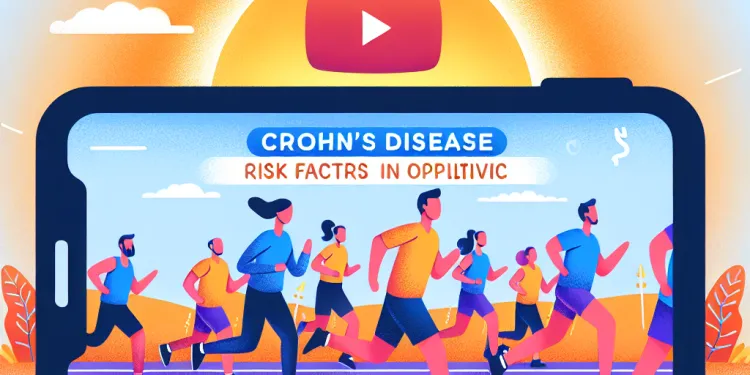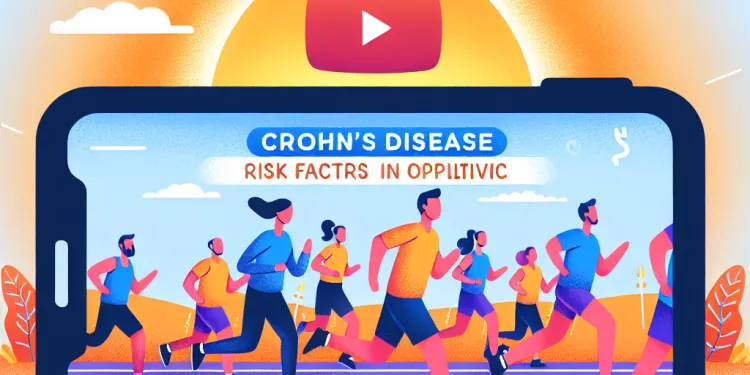
Find Help
More Items From Ergsy search
-

Who is at risk of developing Crohn's disease?
Relevance: 100%
-

Can children develop Crohn's disease?
Relevance: 84%
-

Is there a cure for Crohn's disease?
Relevance: 72%
-

What causes Crohn's disease?
Relevance: 71%
-

Is Crohn's disease contagious?
Relevance: 70%
-

How does smoking affect Crohn's disease?
Relevance: 67%
-

Are there any complications associated with Crohn's disease?
Relevance: 67%
-

What is Crohn’s disease and how is it treated?
Relevance: 67%
-

What treatments are available for Crohn's disease?
Relevance: 65%
-

Is surgery necessary for Crohn's disease?
Relevance: 64%
-

How is Crohn's disease diagnosed?
Relevance: 64%
-

What are the common symptoms of Crohn's disease?
Relevance: 63%
-

What is the best diet for Crohn’s disease?
Relevance: 61%
-

Can stress make Crohn's disease worse?
Relevance: 60%
-

What support is available for people with Crohn's disease in the UK?
Relevance: 59%
-

What dietary changes can help manage Crohn's disease?
Relevance: 57%
-

Who is at risk of developing Alzheimer's disease?
Relevance: 57%
-

Infliximab infusion (Remicade) for Crohns Disease at Addenbrookes NHS hospital
Relevance: 51%
-

Who is at risk for developing BPH?
Relevance: 46%
-

Who is at risk of developing shingles?
Relevance: 44%
-

Who is at risk of developing eczema?
Relevance: 42%
-

Who is at risk of developing SAD?
Relevance: 42%
-

Who is at risk for flesh-eating disease?
Relevance: 41%
-
Who is at risk for developing an eating disorder?
Relevance: 39%
-

Are there any risk factors for developing hypotony?
Relevance: 39%
-

Who is at risk of developing chronic fatigue syndrome?
Relevance: 38%
-

What are risk factors for developing sleep apnea?
Relevance: 37%
-

Who is at risk of developing shingles?
Relevance: 36%
-

What factors increase my risk of colorectal cancer?
Relevance: 34%
-

What are the risk factors for bowel cancer?
Relevance: 34%
-

Who is at risk for motor neurone disease?
Relevance: 31%
-

What role does diet play in the risk of developing bowel cancer?
Relevance: 30%
-

Causes of coeliac disease
Relevance: 30%
-

What causes motor neurone disease?
Relevance: 29%
-

What causes Alzheimer's disease?
Relevance: 29%
-

Is there a vaccine for Lyme disease?
Relevance: 29%
-

New Study Links Diet Soda to Increased Risk of Heart Disease
Relevance: 29%
-

Does fiber reduce the risk of certain diseases?
Relevance: 29%
-

What is Alzheimer's disease?
Relevance: 28%
-

Does drinking coffee every morning increase the risk of developing high blood pressure?
Relevance: 28%
Who is at Risk of Developing Crohn's Disease?
Genetic Predisposition
Individuals with a family history of Crohn's disease are at a higher risk of developing the condition. If a close relative, such as a parent or sibling, has Crohn's, your chances of being diagnosed are significantly increased. Studies have shown that about 15% to 20% of individuals with Crohn's disease have a first-degree relative who is also affected.
Age Factor
Crohn's disease can manifest at any age; however, it is most commonly diagnosed in individuals between the ages of 15 and 30. People in this age group should be particularly vigilant about symptoms and risk factors associated with the disease.
Ethnic and Regional Background
Although Crohn's disease occurs worldwide, certain ethnic groups are more susceptible. In the UK, people of Caucasian descent are more likely to develop Crohn's, particularly those of Ashkenazi Jewish ancestry. However, the incidence in South Asian and other ethnic communities is rising, suggesting a multi-factorial etiology involving environmental factors.
Lifestyle Factors
Cigarette smoking is a significant risk factor for developing Crohn's disease. Smokers are at a higher risk than non-smokers, and smoking can exacerbate symptoms and lead to more severe disease progression. Additionally, diet and lifestyle habits, such as a high intake of processed foods and low fiber diets, may contribute to the risk of developing the disease.
Geographical Influence
People residing in urban areas of the UK are more likely to develop Crohn's disease compared to those living in rural areas. This pattern may be linked to differences in lifestyle, environmental factors, and exposure to industrial pollutants.
Environmental Triggers
It is proposed that environmental factors, such as infections from certain bacterial pathogens and changes in the gut microbiota, can act as triggers in genetically susceptible individuals. Living environments and hygiene practices can influence the risk, supporting the hygiene hypothesis, which suggests that a lack of exposure to infectious agents and microorganisms might increase susceptibility to autoimmune conditions.
Who Can Get Crohn's Disease?
Family History
If someone in your family has Crohn's disease, you might get it too. If a close family member, like your mum, dad, brother, or sister, has Crohn's, there is a bigger chance you might have it. About 15 to 20 out of 100 people with Crohn's have a family member who also has it.
Age
Anyone can get Crohn's disease, but it usually shows up when people are between 15 and 30 years old. People in this age range should look out for signs of the disease.
Background and Where You Live
People from some ethnic groups are more likely to get Crohn's. In the UK, white people, especially those with Jewish family background, are more likely to have it. But more people from South Asian backgrounds are getting it too. Where you live and things around you can also affect risk.
Lifestyle
Smoking cigarettes can make you more likely to get Crohn's disease. Smoking can also make symptoms worse. Eating lots of processed foods and not enough fruits and vegetables might also raise your risk.
Where You Live
People living in cities in the UK are more likely to have Crohn's disease than those in the countryside. This might be because of lifestyle differences and pollution in cities.
Environment
Things in the environment, like certain germs and changes in the bacteria in your gut, might start Crohn's disease in some people. Keeping clean and not being around different germs might also affect your chances of getting diseases like Crohn's.
Frequently Asked Questions
What is Crohn's disease?
Crohn's disease is a type of inflammatory bowel disease (IBD) that causes inflammation of the digestive tract, which can lead to abdominal pain, severe diarrhea, fatigue, weight loss, and malnutrition.
Who is at risk of developing Crohn's disease?
The exact cause of Crohn's disease is unknown, but several factors may increase risk. These include age, family history, smoking, and environmental factors. It is more common in people of Caucasian descent and might develop at any age but is more frequently diagnosed in young adults.
Does family history affect the risk of Crohn's disease?
Yes, having a family member with Crohn's disease increases your risk of developing it, indicating a genetic component.
How does smoking influence Crohn's disease risk?
Smoking is a well-known environmental risk factor for developing Crohn's disease. Smokers are more likely to develop the disease than non-smokers, and smoking can worsen the condition.
Are certain age groups more at risk for Crohn's disease?
Crohn's disease can develop at any age, but it is most commonly diagnosed in people between the ages of 15 and 30.
Does ethnicity affect the risk of Crohn's disease?
Yes, Crohn's disease is more common among Caucasians, particularly those of Ashkenazi Jewish descent, although it can affect any ethnic group.
Is there a gender difference in the risk for Crohn's disease?
Crohn’s disease can affect both men and women equally, though some studies suggest a slightly higher prevalence in women.
Can diet and lifestyle affect the risk of Crohn's disease?
While diet and stress may not directly cause Crohn's disease, they can influence intestinal health and potentially trigger symptoms in those already predisposed.
Is there a connection between certain medications and Crohn's disease risk?
There is some evidence to suggest that nonsteroidal anti-inflammatory drugs (NSAIDs) could aggravate Crohn’s disease or trigger symptoms, though they are not directly known to cause the disease.
Can Crohn's disease be prevented?
Currently, there is no known way to prevent Crohn's disease, but avoiding smoking and maintaining a healthy lifestyle may help manage symptoms and reduce complications.
What are common symptoms of Crohn's disease?
Common symptoms include persistent diarrhea, abdominal pain, and cramping, weight loss, reduced appetite, and fatigue.
What complications are associated with Crohn's disease?
Crohn's can lead to complications such as bowel obstruction, ulcers, fistulas, anal fissures, malnutrition, and increased risk of colon cancer.
How is Crohn's disease diagnosed?
Diagnosis may involve a combination of blood tests, stool tests, endoscopy, colonoscopy, and imaging studies such as CT scans or MRIs.
What treatments are available for Crohn's disease?
There is no cure for Crohn's disease, but treatments can include medication (such as anti-inflammatory drugs or immune system suppressors), lifestyle changes, and sometimes surgery.
How can lifestyle changes help manage Crohn's disease?
Adopting a balanced diet, regular exercise, reducing stress, and quitting smoking can help manage symptoms and improve overall well-being for those with Crohn's disease.
What is Crohn's disease?
Crohn's disease is an illness that makes your tummy hurt. It can cause problems with your stomach and intestines, which are parts inside your body that help digest food.
Sometimes, people with Crohn's disease feel very tired and may lose weight because their body is not getting all the nutrients it needs from food.
If you think you might have Crohn's disease, it is important to talk to a doctor. They can help you by giving you medicine or telling you what foods to eat to feel better.
Here are some things that can help:
- Ask an adult to explain things you don't understand.
- Use pictures to help you learn about Crohn's disease.
- Write down any questions you have for the doctor.
Crohn's disease is a sickness that affects the inside of your tummy. It makes parts of your tummy sore and swollen.
This can cause:
- Tummy pain
- Bad diarrhea (runny poo)
- Feeling very tired
- Losing weight
- Not getting enough nutrients from food
Support tools and tips:
- Talk to a friendly doctor.
- Eat soft and gentle foods.
- Get plenty of rest.
- Write down how you feel every day.
- Ask someone to help you if you feel unwell.
Who can get Crohn's disease?
Crohn's disease is a sickness that can hurt your tummy and intestines. Here are some things that might mean someone could get Crohn's disease:
- Family: If someone in your family has Crohn's, you might get it too.
- Age: People often get Crohn's when they are young or middle-aged.
- Smoking: Smoking cigarettes can make it easier to get Crohn's.
- Where you live: People who live in cities, or places where food is processed a lot, might have a higher chance.
If you are worried about Crohn's, talk to your doctor. They can help you understand more.
Tools that can help: Using pictures or videos can help understand what Crohn's disease is. Talking with someone who knows about it can also be useful.
No one knows exactly what causes Crohn's disease, but some things can make it more likely. These things include how old you are, if anyone in your family has it, if you smoke, and where you live. People with light skin get it more often. Anyone can have it, but it usually starts when you are a young adult.
Here are some things that might help:
- Ask your doctor about it.
- Talk to others who have it.
- Read easy books or watch simple videos about it.
Can Crohn's disease run in families?
Can you get Crohn's disease from your family? Some people might get Crohn's disease because others in their family have it too. This means that if your mom, dad, brother, or sister has Crohn's disease, you might get it too.
But not everyone with a family member who has Crohn's will get it. It is just one part of the risk.
To help understand this, you can:
- Talk to your doctor about your family's health.
- Look at family tree charts to see if others had Crohn's disease.
- Ask family members about their health.
Yes, if someone in your family has Crohn's disease, you are more likely to get it too. This means it can run in families.
How does smoking affect the risk of getting Crohn's disease?
Smoking can make it more likely for someone to get Crohn's disease. This is a sickness that hurts the inside of the tummy and the intestines.
Here are some simple ways to understand and learn about Crohn's disease and smoking:
- Watch videos or look at pictures that explain Crohn's disease.
- Talk to a doctor or nurse who can answer questions.
- Use apps or tools that read out loud if it is hard to read.
Smoking can make people sick with Crohn's disease. People who smoke are more likely to get the disease than people who do not smoke. Smoking can make the disease worse.
Who is more likely to get Crohn's disease?
Crohn's disease can happen to people at any age, but it most often starts when people are between 15 and 30 years old.
Can your ethnicity change your chances of getting Crohn's disease?
Some groups of people might get Crohn's disease more often than others. This is what we mean by "ethnicity affecting the risk." To learn more, you can:
- Ask a doctor or nurse about it.
- Read easy books or look for videos about Crohn's disease.
- Talk to someone who knows about Crohn's disease.
These ways can help you understand better.
Yes, Crohn's disease happens more often in white people, especially those from Ashkenazi Jewish families. But it can affect anyone from any background.
Do boys and girls get Crohn's disease differently?
Crohn's disease can make your tummy hurt. It can affect boys and girls. But is it the same for both?
Some tools that can help understand more about Crohn's disease are:
- Colorful pictures to show how the disease works.
- Stories or videos about kids with Crohn's disease.
- An adult to help explain things with easy words.
Crohn's disease can happen to both men and women. Some studies show it might be a bit more common in women.
Can what you eat and how you live change the chance of getting Crohn's disease?
Eating different foods and the way you live might change if you get Crohn's disease. Crohn's disease is a sickness that makes your tummy hurt.
Things that might help:
- Eat healthy foods like fruits and vegetables.
- Try to play and exercise each day.
- Don't smoke.
- Try to relax and keep stress away.
If you have questions, you can ask a doctor or nurse for help. They can tell you about other helpful ways to stay healthy.
Eating certain foods and feeling stressed might not cause Crohn's disease. But they can affect your gut health and might make symptoms worse if you already have a chance of getting it.
Do some medicines increase the risk of getting Crohn's disease?
There is some evidence that a type of medicine called NSAIDs might make Crohn’s disease worse or cause symptoms to show up. But they do not cause Crohn’s disease.
Can we stop someone from getting Crohn's disease?
Right now, we don't know how to stop Crohn's disease from happening. But there are things you can do to help. Don't smoke. Try to stay healthy. This can make you feel better and stop problems from happening.
What are common signs that someone has Crohn's disease?
Crohn's disease can make you feel unwell. Here are some common signs:
- Tummy pain
- Going to the toilet a lot (diarrhea)
- Feeling very tired
- Weight loss
If you think you have these signs, talk to a doctor. You can also ask someone you trust to help you understand.
Common signs include having diarrhea that doesn’t go away, stomach pain, stomach cramps, losing weight, not feeling hungry, and feeling very tired.
What problems can happen with Crohn's disease?
People with Crohn's disease can have some problems:
- Sore tummy (belly).
- Diarrhea (runny poo).
- Tiredness (feeling very sleepy).
- Loss of appetite (not feeling hungry).
- Painful joints (sore places where your bones meet).
Some ways to help:
- Eat healthy food.
- Drink lots of water.
- Rest a lot.
- Visit the doctor often.
Crohn's disease can cause problems like blocked bowels, sores, tunnels in the body called fistulas, tears in the bottom area, not getting enough nutrients, and a higher chance of having colon cancer.
How do doctors find out if someone has Crohn's disease?
Doctors might use different tests to find out what is wrong. These can be blood tests, stool (poo) tests, looking inside the body with a camera, and taking pictures of the body with special machines like CT scans or MRIs.
What helps people with Crohn's disease feel better?
People with Crohn's disease can try different treatments to feel better. Here are some things that can help:
- Medicines: Doctors can give you medicine to help with pain and swelling.
- Healthy Eating: Eating good food can make your tummy feel better.
- Talking to Doctors: Visit your doctor. They know how to help you.
- Rest: Make sure to get enough sleep and take breaks. It helps your body heal.
If you need extra support, think about asking someone for help. They can help you understand and remember what to do.
We can't make Crohn's disease go away, but we can help with some treatments. You can take medicine to feel better. Some of these medicines help with swelling, and others help your immune system. You might also need to change some things in your daily life. Sometimes, people need an operation.
How can changes in the way we live help with Crohn's disease?
Crohn's disease is a sickness that affects the gut. It can make your belly hurt and cause other problems.
Here are some simple ways to feel better:
- Eat healthy food: Try eating fruits, veggies, and whole grains. They can help your gut.
- Exercise: Go for walks or play outside. It can make you feel happier and healthy.
- Relax: Do things that make you calm, like reading or listening to music.
- Drink water: Water helps your body stay strong and works well.
- Sleep well: Rest is important. Try to go to bed at the same time every night.
Talking to a doctor or nurse is always a good idea. They can help you make the best choices for you.
If you have Crohn's disease, there are things you can do to feel better.
1. Eat a healthy mix of foods.
2. Exercise regularly. This means moving your body often, like walking or playing sports.
3. Try things that help you feel calm and happy. This can be drawing, reading, or deep breathing.
4. Stop smoking if you smoke. It is not good for you.
Useful Links
This website offers general information and is not a substitute for professional advice.
Always seek guidance from qualified professionals.
If you have any medical concerns or need urgent help, contact a healthcare professional or emergency services immediately.
Some of this content was generated with AI assistance. We’ve done our best to keep it accurate, helpful, and human-friendly.
- Ergsy carfully checks the information in the videos we provide here.
- Videos shown by Youtube after a video has completed, have NOT been reviewed by ERGSY.
- To view, click the arrow in centre of video.
- Most of the videos you find here will have subtitles and/or closed captions available.
- You may need to turn these on, and choose your preferred language.
- Go to the video you'd like to watch.
- If closed captions (CC) are available, settings will be visible on the bottom right of the video player.
- To turn on Captions, click settings .
- To turn off Captions, click settings again.
More Items From Ergsy search
-

Who is at risk of developing Crohn's disease?
Relevance: 100%
-

Can children develop Crohn's disease?
Relevance: 84%
-

Is there a cure for Crohn's disease?
Relevance: 72%
-

What causes Crohn's disease?
Relevance: 71%
-

Is Crohn's disease contagious?
Relevance: 70%
-

How does smoking affect Crohn's disease?
Relevance: 67%
-

Are there any complications associated with Crohn's disease?
Relevance: 67%
-

What is Crohn’s disease and how is it treated?
Relevance: 67%
-

What treatments are available for Crohn's disease?
Relevance: 65%
-

Is surgery necessary for Crohn's disease?
Relevance: 64%
-

How is Crohn's disease diagnosed?
Relevance: 64%
-

What are the common symptoms of Crohn's disease?
Relevance: 63%
-

What is the best diet for Crohn’s disease?
Relevance: 61%
-

Can stress make Crohn's disease worse?
Relevance: 60%
-

What support is available for people with Crohn's disease in the UK?
Relevance: 59%
-

What dietary changes can help manage Crohn's disease?
Relevance: 57%
-

Who is at risk of developing Alzheimer's disease?
Relevance: 57%
-

Infliximab infusion (Remicade) for Crohns Disease at Addenbrookes NHS hospital
Relevance: 51%
-

Who is at risk for developing BPH?
Relevance: 46%
-

Who is at risk of developing shingles?
Relevance: 44%
-

Who is at risk of developing eczema?
Relevance: 42%
-

Who is at risk of developing SAD?
Relevance: 42%
-

Who is at risk for flesh-eating disease?
Relevance: 41%
-
Who is at risk for developing an eating disorder?
Relevance: 39%
-

Are there any risk factors for developing hypotony?
Relevance: 39%
-

Who is at risk of developing chronic fatigue syndrome?
Relevance: 38%
-

What are risk factors for developing sleep apnea?
Relevance: 37%
-

Who is at risk of developing shingles?
Relevance: 36%
-

What factors increase my risk of colorectal cancer?
Relevance: 34%
-

What are the risk factors for bowel cancer?
Relevance: 34%
-

Who is at risk for motor neurone disease?
Relevance: 31%
-

What role does diet play in the risk of developing bowel cancer?
Relevance: 30%
-

Causes of coeliac disease
Relevance: 30%
-

What causes motor neurone disease?
Relevance: 29%
-

What causes Alzheimer's disease?
Relevance: 29%
-

Is there a vaccine for Lyme disease?
Relevance: 29%
-

New Study Links Diet Soda to Increased Risk of Heart Disease
Relevance: 29%
-

Does fiber reduce the risk of certain diseases?
Relevance: 29%
-

What is Alzheimer's disease?
Relevance: 28%
-

Does drinking coffee every morning increase the risk of developing high blood pressure?
Relevance: 28%


